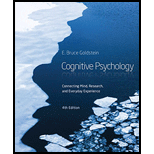
Introduction
According to Baddeley & Hitch, the central executive, defined as the attention controller, is a component of working memory that controls the flow of information. Studies on individuals with and without brain damage have supported the presence of the central executive and its role in attention.
Explanation of Solution
Answer and explanation
The central executive is involved in coordinating and controlling how information is shared between the two components of the working memory – the phonological loop and the visuospatial sketchpad. Thus, instead of being involved in the storage of information, the central executive is concerned with managing the flow of information and also how attention is focused on certain tasks.
In order to understand the role of the central executive, researchers studied patients with brain damage. It was observed that individuals with brain damage repeatedly performed certain actions even when they were futile and provided no help in achieving the desired goal, known as perseveration. For example, when asked to pick a red object for a few trials and to then shift their attention to the blue object in the next trials, patients with brain damage continued to pick the red object. Thus, this tendency of people with brain damage to continue to perform a task even when it serves no purpose represents a failure in the ability of their central executive to manage attention.
Vogel and colleagues (2005) studied how the central executive's ability to control attention differs between individuals with low and high working memory capacity. In this experiment, Vogel and colleagues divided the participants into two groups – high-capacity group and low-capacity group. The change detection procedure was used and the event-related potential (ERP), which indicates the amount of space used in the working memory, was measured. They found that the two groups did not differ in the size of the ERP. However, when the task was made more complex by adding additional stimuli, a significant increase in the ERP response of low-capacity group was observed. This suggested that the central executive of people with high working memory capacity was able to efficiently manage attention and remove distractions, but the central executive of people with low working memory capacity was inefficient in controlling attention. Thus, it was concluded that individuals who have high working memory capacity perform better on tests of general intelligence which measure reasoning and reading abilities.
Want to see more full solutions like this?
Chapter 5 Solutions
Cognitive Psychology: Connecting Mind, Research and Everyday Experience (MindTap Course List)
 Ciccarelli: Psychology_5 (5th Edition)PsychologyISBN:9780134477961Author:Saundra K. Ciccarelli, J. Noland WhitePublisher:PEARSON
Ciccarelli: Psychology_5 (5th Edition)PsychologyISBN:9780134477961Author:Saundra K. Ciccarelli, J. Noland WhitePublisher:PEARSON Cognitive PsychologyPsychologyISBN:9781337408271Author:Goldstein, E. Bruce.Publisher:Cengage Learning,
Cognitive PsychologyPsychologyISBN:9781337408271Author:Goldstein, E. Bruce.Publisher:Cengage Learning, Introduction to Psychology: Gateways to Mind and ...PsychologyISBN:9781337565691Author:Dennis Coon, John O. Mitterer, Tanya S. MartiniPublisher:Cengage Learning
Introduction to Psychology: Gateways to Mind and ...PsychologyISBN:9781337565691Author:Dennis Coon, John O. Mitterer, Tanya S. MartiniPublisher:Cengage Learning Psychology in Your Life (Second Edition)PsychologyISBN:9780393265156Author:Sarah Grison, Michael GazzanigaPublisher:W. W. Norton & Company
Psychology in Your Life (Second Edition)PsychologyISBN:9780393265156Author:Sarah Grison, Michael GazzanigaPublisher:W. W. Norton & Company Cognitive Psychology: Connecting Mind, Research a...PsychologyISBN:9781285763880Author:E. Bruce GoldsteinPublisher:Cengage Learning
Cognitive Psychology: Connecting Mind, Research a...PsychologyISBN:9781285763880Author:E. Bruce GoldsteinPublisher:Cengage Learning Theories of Personality (MindTap Course List)PsychologyISBN:9781305652958Author:Duane P. Schultz, Sydney Ellen SchultzPublisher:Cengage Learning
Theories of Personality (MindTap Course List)PsychologyISBN:9781305652958Author:Duane P. Schultz, Sydney Ellen SchultzPublisher:Cengage Learning





